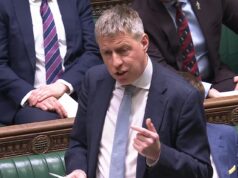In response to a written question from Labour MP Paula Barker regarding the government’s support for UK defence manufacturing, the Ministry of Defence (MoD) has outlined its commitment to strengthening the sector.
Barker asked what steps the government is taking to support UK defence manufacturing through procurement processes.
In her written response, Minister of State for Defence Maria Eagle highlighted the crucial role the UK’s defence manufacturing industry plays, not only in national security but also in economic growth. Eagle described the government’s dedication to bolstering the UK’s defence industrial base.
“The UK’s defence manufacturing industry is vital not only to our national security but to our prosperity and economic growth,” said Eagle, adding that the government will introduce a new Defence Industrial Strategy. “This Government is committed to developing a UK defence industrial base that is able to better support our own and allies’ security.”
The new Defence Industrial Strategy aims to “ensure a strong defence sector and resilient supply chains, across the whole of the UK.”
The previous iteration of the strategy, introduced in 2005, was designed to ensure that the UK Armed Forces received necessary equipment on time and at the best value for money, while maintaining key sovereign capabilities within UK defence companies.
The previous strategy was structured into three parts: it outlined the strategy, reviewed the UK defence industry, and described its implementation. This policy built upon earlier initiatives like the 2002 Defence Industrial Policy and the Strategic Defence Review of 1998.
Notably, it departed from the earlier competitive tendering models introduced during the Thatcher government, which had prioritised an open market. Instead, the 2005 DIS reintroduced the concept of “national champions” in key areas, ensuring that UK companies would retain the capability to produce vital defence equipment.














All orders placed ages ago.
What would strengthen it are some follow on orders!
But that requires money and that is all been spent on massive public sector pay rises that are massively inflation busting.
Meanwhile in MoD world pay rises are parsimonious and not pitched to stop the exodus. There must be a cost benefit analysis or increasing pay to reduce training costs – sorry that is long term thinking beyond a five year horizon – silly me…
The trouble is that the junior doctor strike was just going to go on and on and the only loser were the patients.
The junior doctors I have less problem with although I have a major problem with the activist and destructive BMA that all the junior doctors that I know share.
I do …merely a political action and they are now being rewarded accordingly …as are Train Drivers
Well Labour were always going to pay their Union dues first, their TUC paymasters would have it no other way…
oh thats OK then…
And what would your solution be ? Just sit there for the next couple of years while strikes drag on and on. With waiting lists going up and up
In case of the train drivers just automated it. Japan has driverless trains on trial where as I doubt it’ll ever feature in Labour’s plans to modernise
No union should be able to play politics it’s essentially corruption of the political system if we have to vote Labour to ensure services are delivered. Anyone advocating it is no friend of freedom or democracy imo.
The first thing they did was get rid of a grant for Ai research set up by Sunak, was that (being cynical) because of the potential to eat into human jobs? Hope not because like it or not you can’t escape its effects unless everyone is on board, Ludditetism is pointless these days in a global economy. The concern should be over its safety, job losses are inevitable which is why the blabber over overtly promoting immigration to fill jobs is rather missing the point of what’s likely a step change over the next decade or so in employment. Can Labour with its ties to unions have a chance of confronting such a sea-change sensibly?
Yep. I’ve been of the opinion for some time we’ll need to have a universal basic income at some point because automation and AI will remove jobs. Which creates a problem because automation and AI will generate taxable revenue but because we refuse to acknowledge that tech will take jobs we have increased immigration so the revenue created for universal income will be distributed to bigger pool of people which means less for everyone.
Pity the MoD allowed sole high explosive plant to close. The UK can no longer manufacture the filling for explosive shells and is totally reliant on imports from Europe and the USA. Shame on MoD permitting a strategic asset to cease operations.
This fantasy defence industry will no doubt be using Chinese virgin steel. Maybe Russian. How you can strengthen something by making its main ingredients overseas is another Labour lie.
Unljke the myriad tory toerag lies of course 🙄
I have very little respect for any politicians. Plus they all lie. This lot have got of to the worst start for me. Ending the production of virgin steel is economic,environmental and defence suicide in my eyes. At least the last lot bought Forgemasters to secure a supply chain. Environmentally their filtration building dominates that end of Sheffield. There will be no mitigation from the countries we buy steel from. Plus their record in safety and deaths is shocking.
I agree about the ending of virgin steel production in the UK. But was any of it used for defence purposes ? Scunthorpe I thought mostly went for rail production and Port Talbot is for coil and the tin plate plant in Trostre. There is an on site Arc furnace at Forgemasters.
Flat steel, angles, beams, channels, round and square bar. A lot of rail.
I was thinking of the Railway type of rail. I am sure Scunthorpe has an on site plant for the manufacture of railway rail
They use continuous casting at Scunthorpe which is how they make rails. It’s only one of the products they make. Rolling Mills for sheets etc for example
That’s very true, when we allow our explosive propellents and steel industry to die, both critical to defence….
A bloody joke quite frankly, Labour spinning nonsense and doing absolutely sod all, same as the last bunch of useless bloody idiots.
👍
If you look at UK manufacturing in WW2 it’s strength was it diverse global supply chain and not having entirely domestic supply chains.
Well, Someone could make use of recycled steel from all those knocked-out Russian AFVs in UKR.
The industry needs strength through depth, and that can only happen if there is a healthy home market.
Are the government trying to do something right ? Maybe wise if the PM takes a look at our Steel industry 🙄
Letting the old tank Vickers factory close down in 2017 was a huge mistake, especially as at the time the army needed replacements for CVR(T) and upgrade/replacement for Warriors.
👍
That just about is the perfect summing up of the inherent comp,agency and delusion. Who could have felt that a safe bet in 2017, but then the damage to its viability had no doubt been building for decades through inaction and neglect, the answer to so many ills of British industry post war.
Really? By selling off the sovereign defence manufacturing sector? and giving orders to German & American companies which then fail dismally to perform? This is somehow quite acceptable with US (GD, LM) or other foreign contractors. However, should a British company fail they are to be struck off never to receive another contract. How ending steel production, not producing engines, energetics or a host of other things is ‘strengthening’ is a mystery to me! There is no strategy, plan, contracting law or Buy British policy